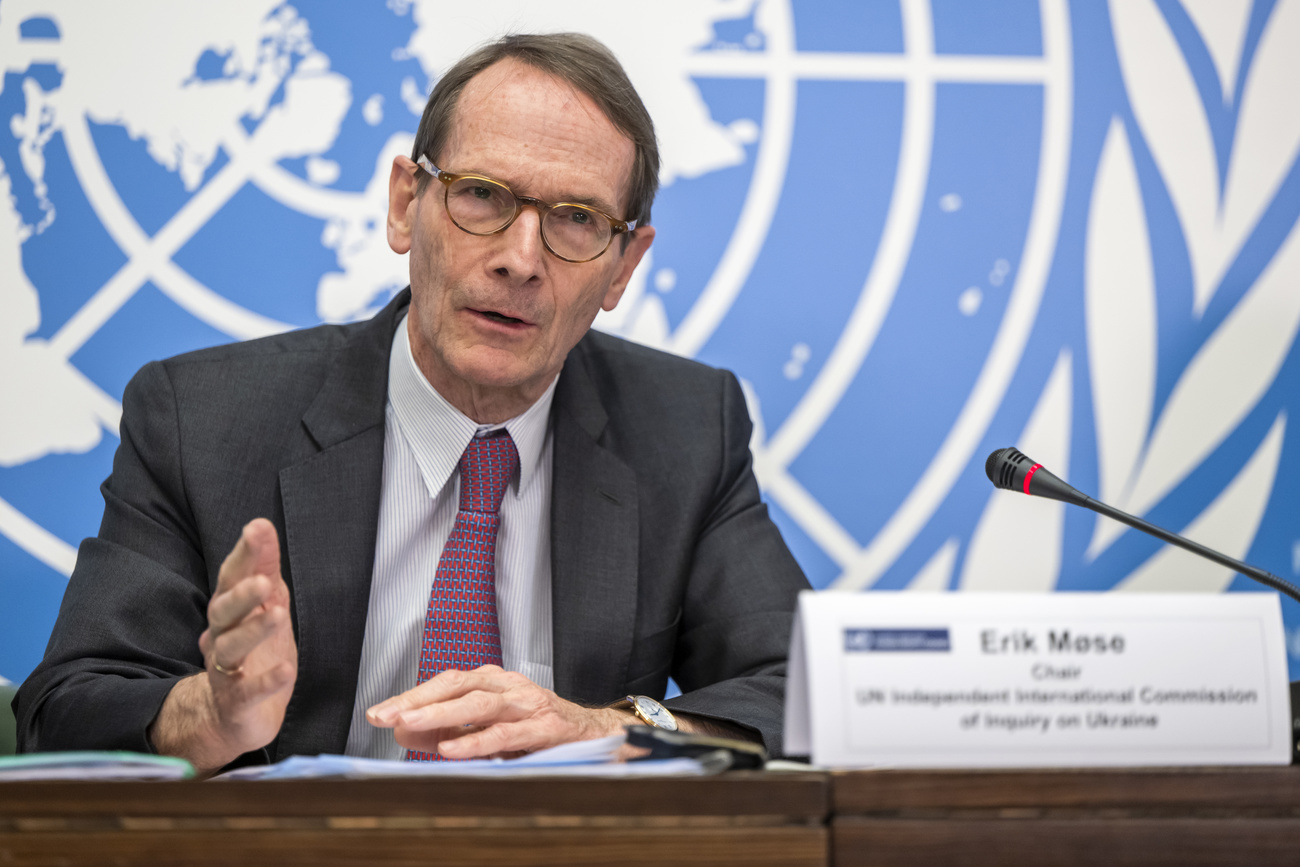
UN Commission of Inquiry says Russia has committed a ‘wide range’ of war crimes

A UN-mandated investigation found that Russia has committed war crimes and possibly crimes against humanity in Ukraine. The information it collected might be used in the future by prosecutors building cases.
Based on the evidence it gathered, the UN Independent Commission of Inquiry on UkraineExternal link determined that Russian forces have, since February 2022, committed a “wide range” of violations of international law in Ukraine and Russia, many of which amount to war crimes. These include attacks on civilians, acts of torture, sexual violence, and deportations of children, according to the commission’s final report released on Thursday.
“We have not found that there has been a genocide in Ukraine,” Erik Møse of Norway, chairman of the commission, told journalists at a press conference in Geneva. However, the commission considers that the ongoing wave of attacks on Ukrainian energy infrastructure that Moscow has carried out since October 2022 could amount to crimes against humanity. Patterns of torture, especially in places of detention, might also qualify as crimes against humanity. It recommends further investigation to determine if conditions for this are met.
It also documented a “small number” of violations committed by Ukrainian forces which include “likely indiscriminate” attacks and two incidents qualifying as war crimes.
The Commission of Inquiry on Ukraine was established by the Geneva-based Human Rights Council in March 2022 to investigate alleged violations of human rights and international humanitarian law in Ukraine. Its two other commissioners are Jasminka Džumhur of Bosnia and Herzegovina, and Pablo de Greiff of Colombia. It is supported by a small team of eight investigators.
For its work, the commission travelled to Ukraine eight times and visited 56 localities. It conducted both in-person and remote interviews with 595 individuals, 348 of them women. Sites of destruction, graves, and places of detentions, among other sites, were inspected by the commission, which also consulted documents, satellite images, and videos.
Further investigation
The commission recommends that “all violations and crimes” be investigated and that those responsible be held accountable. It has sought to identify individuals, military units, and chains of command responsible for the alleged crimes it investigated. A confidential list of possible perpetrators has been drawn up for the UN Human Rights Office.
The 47 member states of the Human Rights Council, which are meeting in Geneva until April 4, will discuss the report on Monday. They will decide whether to extend the commission’s mandate and may decide to put forward another resolution to follow up on its findings.
On Monday, the New York TimesExternal link reported that the International Criminal Court (ICC) intends to open two war crimes casesExternal link over abduction of Ukrainian children and targeting of civilian infrastructure linked to Russia’s invasion of Ukraine. It is expected to seek arrest warrants for several people.
ICC prosecutor Karim Khan, who launched an investigation into alleged war crimes, crimes against humanity, and genocide in February 2022, was in Geneva last week. He met with the UN High Commissioner for Human Rights Volker Türk, among other people.
The Commission of Inquiry on Ukraine confirmed it is in contact with the office of the ICC prosecutor. Part of its mandate is to preserve the evidence it gathers for “future legal proceedings”. But could it ever be used in court?
New territory
“We’re in quite new territory,” says Kingsley Abbott, a director at the International Commission of Jurists (ICJ), a Geneva-based NGO. “It is early days in terms of seeing how the information gathered by this commission of inquiry and others with very similar mandates will be used.”
Asked about whether the commission had received requests from the ICC or other prosecutors, commissioner Pablo de Greiff said that had not yet been the case, as the investigation was still underway, and the report just released.
Over the last decade, several UN-mandated investigative bodies tasked with the collection, consolidation, and preservation of evidence of violations of international law have been established.
Abbott points out that a commission of inquiry gathers evidence to a lower evidential standard than is necessary for it to be used in trial. “But that’s not to say that this information won’t be used by courts and tribunals,” he says. “It could be that the information is used as what we call lead evidence so that it provides leads for prosecutors to conduct further inquiries to a much higher standard.”
The International, Impartial and Independent Mechanism (IIIM) on international crimes committed in Syria, established in 2016 to complement the work of the Commission of Inquiry on Syria, has reported having received 93 requests for assistance from 11 competent jurisdictions. Some of these concerned cases in which a suspect was in detention and/or that have led to trial proceedings.
The three members of the Commission of Inquiry on Ukraine and Abbott underlined the importance of coordinating the myriad of investigations into alleged international crimes in Ukraine.
“The challenge is coordination so that all of these bodies carrying out these investigations end up doing a job that furthers justice and furthers the interests of victims, rather than becoming a siloed, competitive space for duplication,” says Abbott.
Edited by Virginie Mangin

In compliance with the JTI standards
More: SWI swissinfo.ch certified by the Journalism Trust Initiative


























You can find an overview of ongoing debates with our journalists here . Please join us!
If you want to start a conversation about a topic raised in this article or want to report factual errors, email us at english@swissinfo.ch.